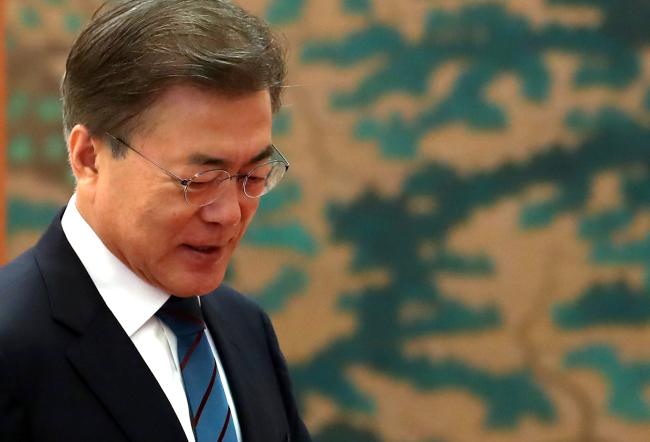Moon govt. needs 'comprehensive' strategy for NK nuke dismantlement by 2020
By Catherine ChungPublished : July 19, 2017 - 14:26
South Korea needs to map out its "comprehensive" negotiation strategy aimed at inducing an agreement to completely dismantle North Korea's nuclear program by 2020, a presidential advisory body said Wednesday.
The State Affairs Planning Advisory Committee also advised the Moon Jae-in government to use all possible means to address the North's nuclear threat, including possibly resuming the long-suspended six-party denuclearization talks.
They are part of the policy recommendations made by the committee which recently wrapped up its two months of activities.
It has served as a de facto transition team for Moon who was inaugurated immediately after winning a by-election held on May 9 prompted by the ouster of his predecessor involved in a massive corruption scandal.
The State Affairs Planning Advisory Committee also advised the Moon Jae-in government to use all possible means to address the North's nuclear threat, including possibly resuming the long-suspended six-party denuclearization talks.
They are part of the policy recommendations made by the committee which recently wrapped up its two months of activities.
It has served as a de facto transition team for Moon who was inaugurated immediately after winning a by-election held on May 9 prompted by the ouster of his predecessor involved in a massive corruption scandal.

"To induce an agreement by 2020, it is necessary to prepare a comprehensive denuclearization strategy seeking a complete nuclear dismantlement by way of a freeze," the committee said.
To keep the process on track, the committee said that the government should work hard to prevent additional provocations, while at the same time seeking talks including the long-suspended six-party platform to secure a "tangible" progress in denuclearization efforts.
"It needs to lead the North to denuclearize by employing all available means, including sanctions and dialogue," it noted.
The six-party talks involving the two Koreas, the US, China, Russia and Japan started in 2003 to persuade the North to give up its nuclear aspirations. It, however, has not been held since late 2008 when the North walked away from the negotiating table.
North Korea conducted nuclear tests twice last year alone. On July 4, it claimed to have held a successful test of an intercontinental ballistic missile, ratcheting up tensions surrounding the Korean Peninsula and drawing strong condemnation from the international community.
In his speech in Berlin on July 6, President Moon emphasized the importance of dialogue to address the nuclear issue. He added that his government will work to establish a permanent peace regime on the peninsula.
In a follow-up measure earlier this week, South Korea offered to hold inter-Korean military talks on Friday to ease tensions along the tense border and Red Cross talks on Aug. 1 to resume reunions of families separated by the 1950-53 Korean War. There has been no response from the North to the overtures.
The committee said that it is necessary to prepare a "road map" by the end of this year through which the government can discuss the issue of establishing a peace regime on the peninsula, but noted it should be sought based on efforts to secure support from major powers and international community.
It also advised the Moon government to "regularize" inter-Korean talks and also reconnect the communications channel between the two divided countries. It asked for efforts to seek talks with the reclusive state in the sports, military and economic sectors.
On top of pursuing talks, the committee advised the government beef up its efforts to secure military readiness against the North.
In particular, it underlined the need to enhance its ability to counter "asymmetric" threats from the North such as its nuclear, missile and cyber attacks.
The committee recommended the government take back wartime operational control of the country's forces from the US "as early as possible" through which South Korea needs to build a joint defense posture spearheaded by "our military." (Yonhap)




![[Herald Interview] 'Amid aging population, Korea to invite more young professionals from overseas'](http://res.heraldm.com/phpwas/restmb_idxmake.php?idx=644&simg=/content/image/2024/04/24/20240424050844_0.jpg&u=20240424200058)











![[KH Explains] Korean shipbuilding stocks rally: Real growth or bubble?](http://res.heraldm.com/phpwas/restmb_idxmake.php?idx=652&simg=/content/image/2024/04/25/20240425050656_0.jpg&u=)

